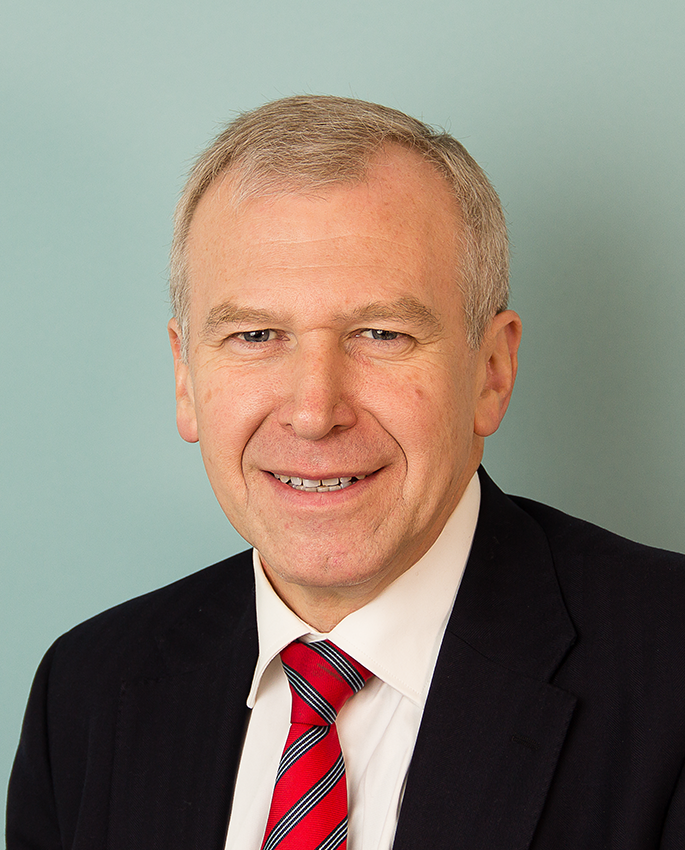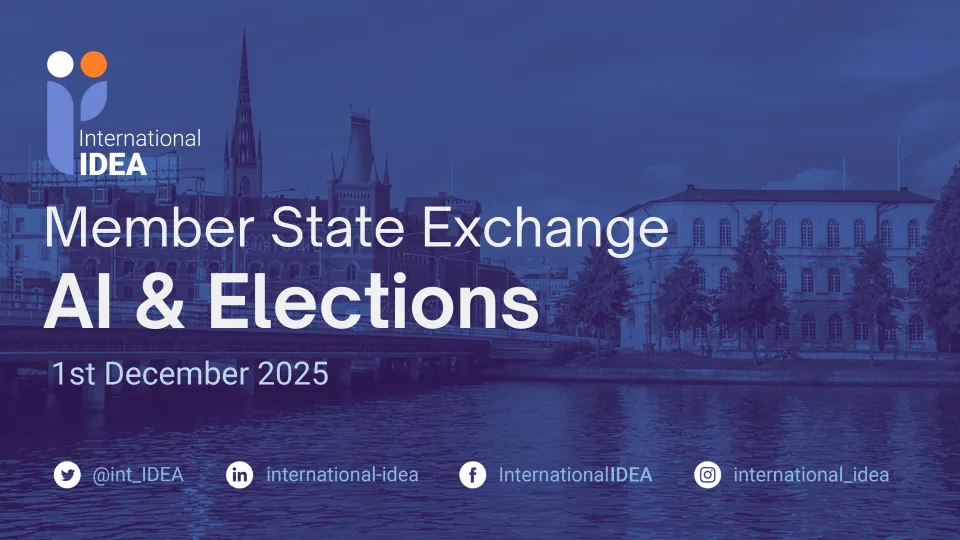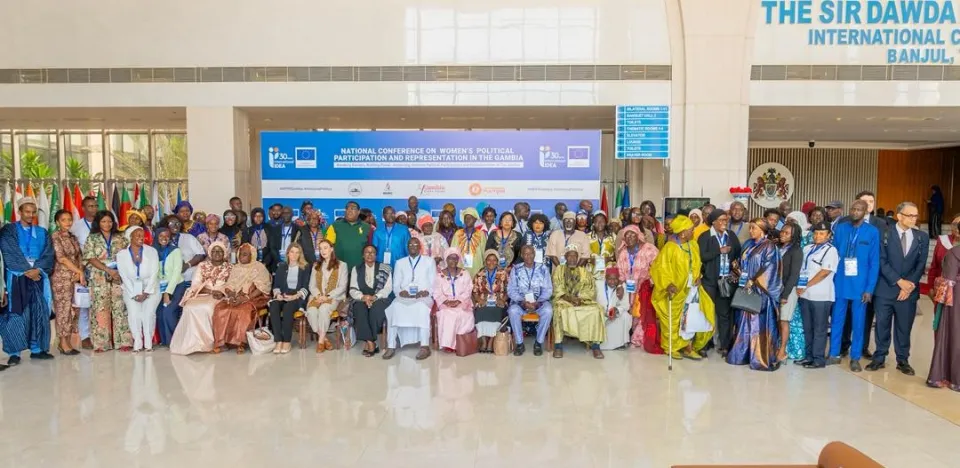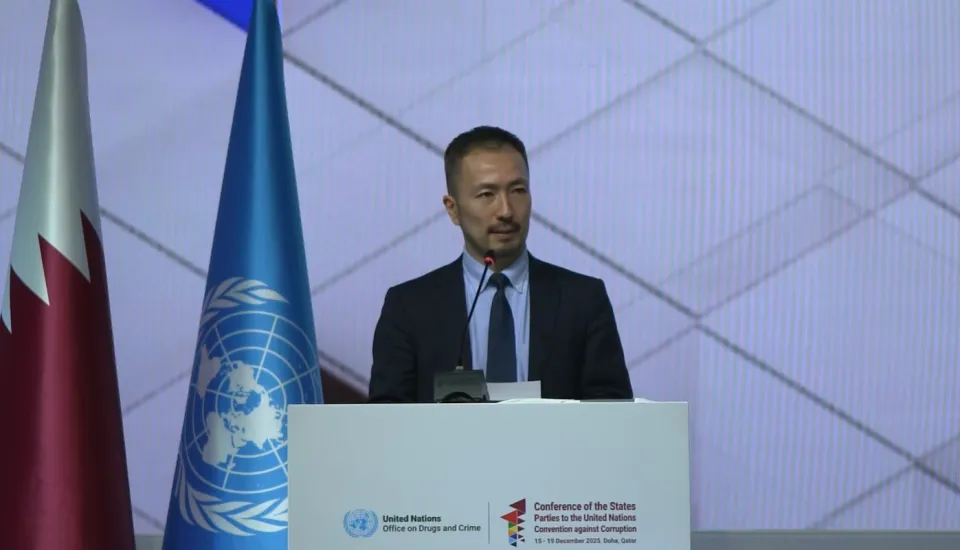I am pleased to present another edition of International IDEA’s newsletter. As the year draws to a close, I would like to highlight some of 2015’s key events.
Institutional priorities
International IDEA celebrated its 20-year anniversary at the Swedish Parliament on 16 September, with more than 300 participants and International IDEA partners, representatives of Member States and leaders of think tanks and NGOs from around the world. The wide attendance to this celebratory event clearly demonstrated once again the strong commitment that our partners and Member States have to International IDEA.
We are very grateful to the Speaker of the Swedish Parliament Urban Ahlin, who co-hosted the event with me, and we were honored by the presence of Royal Highness Crown Princess Victoria of Sweden. Kofi Annan participated as a keynote speaker and Swedish Foreign Minister Margot Wallström led a panel discussion that discussed regional achievements and challenges to democracy on the global landscape.
The discussion panel included Thorbjørn Jagland, Secretary General of the Council of Europe, Minister José Antonio Dias Toffoli, president of the Superior Electoral Court of Brazil, Surin Pitsuwan, former Secretary General of the Association of Southeast Asian Nations, Brigalia Bam, former chairman of the Independent Electoral Commission of South Africa, and Hesham Youssef, assistant Secretary General for Humanitarian Affairs in the Organization of Islamic Cooperation. The anniversary and adjacent events provided us with an excellent opportunity to take stock of the state of democracy in the world and International IDEA’s achievements to date, with insights from global leaders in the field.
On the occasion of the Ministerial Council meeting, held on the International Day of Democracy on 15 September, Member States reaffirmed their commitment to International IDEA by adopting the Declaration of the International IDEA Member States. In the Declaration, Member States reiterated their support to International IDEA's mandate and mission, and underlined the interlinkages between democracy and human rights. The Extraordinary Council meeting in September also provided the opportunity for International IDEA to reaffirm its full commitment to continue serving its Member States in the best possible way.
Other important events in 2015 included the Annual Democracy Forum (ADF), with panel discussions looking into the nexus between accountability and democracy, as well as the Inter-Regional Dialogue on Democracy (IRDD), organized together with the African Union Commission, which discussed democracy-building mechanisms for conflict-affected and fragile states.
Preparations are underway on a signature periodic publication on the state of democracy in the world, which will be published in 2016 and which we hope will become a worldwide resource and reference on democratic trends and developments. Also, for the first time, an institutional communications strategy has been developed (2015-2017) to help ensure that International IDEA increases both the visibility and impact of its programmes.
Global level
At a global level, the Adoption by the UN General Assembly of the 2030 Sustainable Development Goals, in September was an important milestone. Particularly Goal 5 (on gender equality) and 16 (peaceful societies, justice and accountable institutions) represented a global recognition for the issues International IDEA has been advocating for since its creation. This represented a major achievement for International IDEA after arduous advocacy efforts conducted by our New York office to include references to democracy, governance, accountability and gender into the 2030 Sustainable Development goals. Goal 16 represents a breakthrough because it underscores the inter-linkages between rule of law, accountability and peace; provides a framing vehicle for International IDEA’s themes and provides an important entry point for promoting democratic accountability. We will continue to be engaged in defining a framework for monitoring the implementation of the 2030 Sustainable Development Agenda.
Another important event this year reaffirmed International IDEA as a global knowledge leader on the issue: the first Global Conference on Money in Politics, held in Mexico City, co-hosted by us, the Electoral Court of the Federal Judiciary of Mexico, and the Netherlands Institute for Multiparty Democracy, in close cooperation with the Organisation for Economic Co-operation and Development. The conference gathered more than 150 participants, including leading researchers, practitioners and policy makers, to take stock of the state of political finance and related regulations globally; to identify knowledge gaps and identify possible solutions to the challenges posed by this phenomenon. The conference successfully established a global Community of Practice on Money in Politics, which is raising awareness of the issue internationally, sharing research and good practices, and identifying necessary reforms to protect democratic politics from money-based influence and for effective enforcement of political finance regulations. A follow-up conference has taken place this December in New Delhi, India, with a South Asian focus and another will be held in Tbilisi, Georgia in early 2016, with a focus on wider Europe. These conferences will provide inputs for developing policy recommendations to curtail the influence of money in political processes.
Another important institutional highlight this year was “Democratic Transitions: Conversations with World Leaders”, a book published in English by Johns Hopkins University Press. The book presents personal reflections on ending authoritarian rule and building democracy by 13 former presidents in nine countries, who have played key roles in such transformations over the past 30 years. The book allows to extract lessons from successful transitions to democracy that can be of use to countries that have undergone or are undergoing more recent transitions. The book has been promoted through launching events in Washington, D.C., New York, and Brussels and is currently being translated into Spanish, French, Dutch and Arabic, for which launch events will take place in 2016. The book will provide the basis for anchoring the theme of transitions across our programmes.
Wider Europe
Several scoping missions to Ukraine were conducted this year to explore potential for IDEA engagement. The missions included consultative meetings with relevant stakeholders to explore possibilities for engagement in the areas of electoral reform, gender and civic engagement and constitutional reform. These missions have laid the ground for International IDEA’s establishment of a Wider Europe Programme in 2016, of which the activities in Ukraine will become the launch pin, together with Macedonia, where the Government has requested International IDEA support to the electoral process. European institutions are expected to become key partners in our wider Europe programme and we have taken steps to deepen our dialogue and collaboration with the Council of Europe and its institutions (GRECO and the Venice Commission).
Latin America and the Caribbean
In Latin America and the Caribbean, a number of important events has marked this quarter. In July, International IDEA co-hosted the VII Iberoamerican Conference on Electoral Justice, together with Peru’s National Election Board. Attendants included electoral magistrates and representatives from eighteen countries throughout the region who discussed electoral justice, integrity of elections, and the quality of democracy. In August, I travelled to the Dominican Republic, where I met with President Danilo Medina, who confirmed his strong commitment to International IDEA. In the Dominican Republic, I also delivered a keynote speech at the 2nd General Assembly and World Conference of A-WEB (Association of World Election Bodies) on the theme “Role of Challenges of the Electoral Bodies to Guarantee the Integrity of Elections”. International IDEA has been cooperating with A-WEB since its inception and is now moving toward a deepened cooperation through the signing of a memorandum of understanding.
In August, I also attended the Next Generation Democracy-Forum for the Americas hosted by the Club de Madrid in Bogotá, Colombia, in collaboration with International IDEA, FLACSO and Fundación Buen. The event included seven former presidents and prime ministers, among them former President Laura Chinchilla, as well as President Santos and Organization of American States Secretary General Luis Almagro. The debate addressed the need to reinforce the major social gains attained during the last decade to face the danger represented by the economic slowdown; and the need to improve the quality of democracy and the integrity of elections in the region. During my trip to Bogotá, I also met with Colombian Interior Minister Juan Fernando Cristo and took the opportunity to congratulate the Government on the progress of the historical peace negotiations with the FARC guerrillas.
Africa and West Asia
An important development this year was the strategic reorientation of International IDEA’s West Asia and North Africa (WANA) programme, which have been merged into an integrated Africa and West Asia (AWA) programme. This evolution reflects the growing need for International IDEA to work in a more holistic way across all of Africa. However, we recognize the specificities of the West Asia and North Africa region and its work programme and activities will continue, as will the pursuit and exploration of new relevant activities in the region. International IDEA staff working on West Asia will continue to be based in Tunis and Cairo.
Africa
In Africa, International IDEA’s new Regional Director has forged ahead with recruitments to relaunch and restructure the Africa programme, while activities are continuing. For example, two BRIDGE trainings took place in Malawi with EMB staff on strategic and financial planning as well as technologies in elections and on issues related to electoral risk in Burkina Faso. In September, a multi-stakeholder workshop was held in Lilongwe, Malawi on “Strengthening Citizen's Political Participation in Democracy Building” to discuss lessons learned from assessing democratic accountability.
West Asia
In West Asia, on-going activities are continuing with the promotion of women’s political participation in Tunisia and raising awareness around the electoral process in Egypt. International IDEA is also collaborating with the Economic and Social Commission for Western Asia (UNESCWA) to support the “National Agenda for the Future of Syria” project, which discusses options for the future transitional process in Syria.
Asia and the Pacific
In Asia and the Pacific, highlights included continued support in preparation for the first free and fair elections in Myanmar in 25 years. Our team supported the Union Election Commission in the accreditation of election observers. Support was also provided to publish and disseminate voter education material in nine of Myanmar’s languages and information on campaign finance legislation. These historical elections were held peacefully and without major incidents in November and have paved the way for a peaceful transition to democracy in Myanmar. Another milestone in Asia was the approval of the Nepal constitution, to which our team in Kathmandu provided technical assistance throughout the process. Support to the constitution-building process has also been provided in Sri Lanka and we are currently exploring ways to further deepen this assistance.
Outlook
I am proud of International IDEA’s achievements in 2015, enabled thanks to the hard work and commitment of our staff, with the support of our partners, donors and Member States. While I have focused mainly on Global Programmes and regional activities in this newsletter introduction, I also would like to extend my gratitude to the hard work of all the other teams in International IDEA, who have been working equally hard in improving our planning, reporting, budgeting, fundraising process and capacity. As we are nearing the end of 2015, we look ahead at 2016, which will mark the initiation of the process of International IDEA’s next six-year strategy, which I look forward to steering. The political map of the world is constantly changing, with new opportunities and threats to democracy that need to be analysed and addressed by International IDEA in the most effective way. Our new strategy for 2018-2023, will reflect this evolving democratic panorama, to ensure that International IDEA can continue to fulfill its founding mandate to promote and advance sustainable democracy worldwide.




